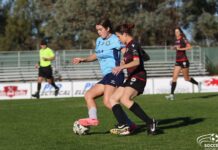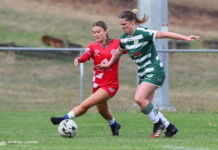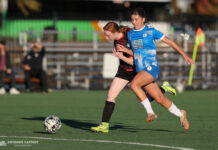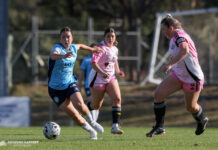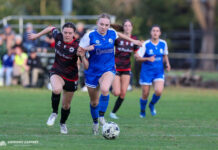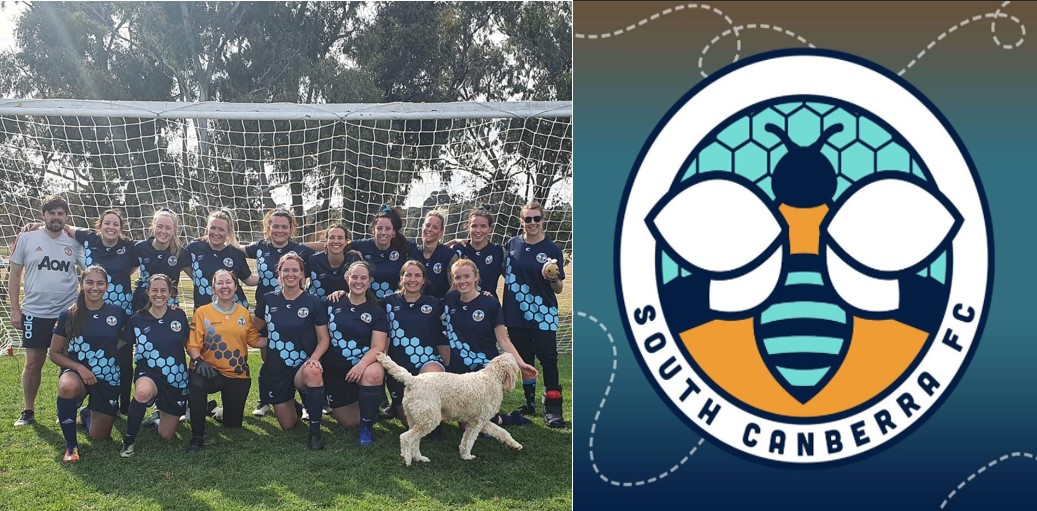
The formation of all women’s club South Canberra FC (see here for their Facebook and Instagram) was a significant story in the Canberra football scene. Having spoken to Bees President Kat Yuile shortly after the founding of the club, we met with both Yuile and Bees co-founder Emma Steel to discuss the club’s first foray into community football.
The first steps
Emma: “I remember it being really exciting.
“I remember spending hours working on vision boards, we worked out merch ideas … I remember there was a lot of back and forth between myself and Kat venting our frustrations, we might hit a roadblock every so often, or you might deal with certain personalities that may not have quite the same vision you do.
“But I think that that diversity allowed for this beautiful thing that we have created.”
“I think if it was just Kat and I dictating the way we wanted the club it could be a little bit different. I think the core values that have been instilled … [are] definitely something that persisted right from the outset of club inception. Kat and I have been around the Canberra footballing community for so long that the values that she and I discussed early on did eventuate into our core club values, only because, if we were feeling it, other girls were too.
“But there were certain things … I think our original idea for kits was vastly different from what we’ve got now. Our idea of who would volunteer on the committee – we’ve been very pleasantly surprised, some people put their hands up that we may not have been expecting.
“The passion just runs really deep. Our committee is chockers.”
On whether the initial vision, core values, and desired behaviours had to be moulded at all during the season:
Kat: “99% of what we saw this season held true to those core values. We did see a little bit of behaviour that didn’t quite stick to it and in some cases, we dealt with it quite well and in other cases, we could improve on how we approached the situation, but that’s a learning [from this season].
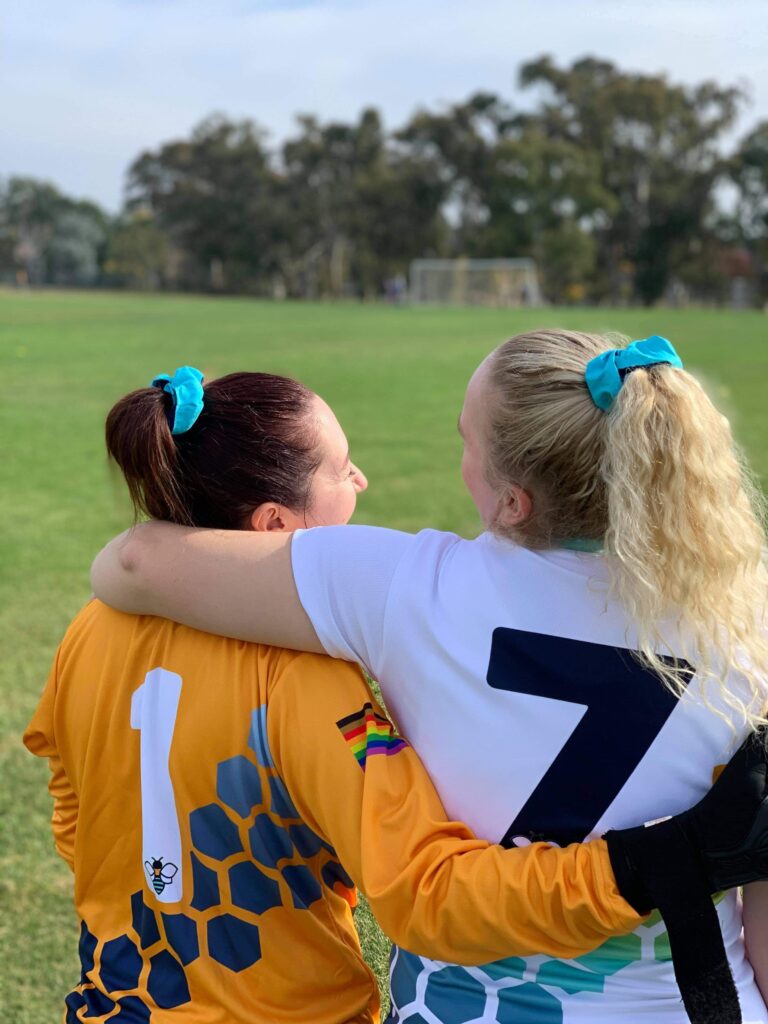
“I think it’s really different when you’re running a club with volunteers and people who are paying money to play football, you’re not at work and you can’t approach those issues the same way you normally would, you need to take a more human person-to-person approach and really dig into what’s happening underneath those behaviours and try and work that through with people.
“Team dynamics are always hard, I think it’s always difficult to have a team where everybody gets along 100% all the time but I think we got really, really close and players always supported each other. We saw a couple of anomalies here and there, and we’ll learn from that, we’ll get better at dealing with that as we go, but certainly, I didn’t see anyone come in that was the complete antithesis of the values, it was just little bits of niggle here and there.
“I had people come up to me and say ‘I haven’t played football in years but I love this environment and this is a great place to be and I’m having a really good time’, and that’s at all levels of the club, and that speaks to how hard we worked to set out that vision in the beginning.”
Competitiveness on the field
Much of the club’s energies understandably went towards the establishment of the club and its operating arrangements, so how did the club fare on the park?
There were initially plans for a Masters team, as well as teams in State League 2 and 3, but such was the interest in the club that a Division 4 team was also established. Furthermore, a Division 1 team from another club approached South Canberra about playing for them instead, so three teams quickly became five.
Emma: “One of those teams was essentially brand new; the vast majority of that team had never played together before. A couple of girls knew each other but … we had so much interest at the start of the season from girls who had played football elsewhere for a long time, or were returning after a break, and one or two brand new to the sport, so we put together a Division 4 team, and they just clicked and played together so well. We got in a couple of brilliant coaches for them, really experienced football players, that just gelled the team. I think it was just a really good mix, and they would have been in finals for sure.”
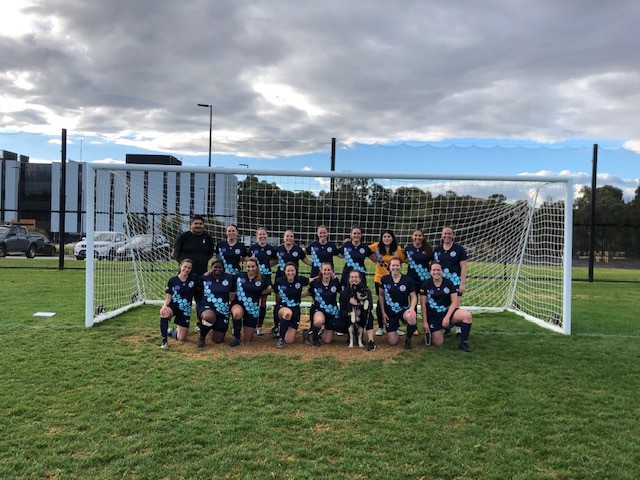
Kat: “And we would have had – we’re thinking – three teams into finals out of five [State Leagues 2, and 4, and Masters]. It’s a bit disappointing that the girls couldn’t go out and compete for that, but I think that’s a pretty good start for the club.”
Successes
Success can be measured in many ways and on all criteria the club exceeded expectations. Interest in the club has been high from many different angles, including local television broadcasters and even interstate football media, all of whom were intrigued by the club’s vision and raison d’être, which is outlined in Beyond 90’s earlier article.
Kat: “I’ve been blown away by the amount of interest we’ve had, and the number of people who have wanted to have a chat with us. A lot of that’s down to Emma and the other girls doing all the branding and the media. It looks really professional.”
Emma: “We allocated a dedicated media person – Nat McCann – which we weren’t expecting at all. We’ve got the most amazing army of volunteers, and Nat put her hand up, saying ‘You’re getting a lot of attention here, do you need help?’.
“In terms of club operations, I can’t think of a negative there. Everything ticked along really smoothly, the downs were the things that were out of our control like the global pandemic.”
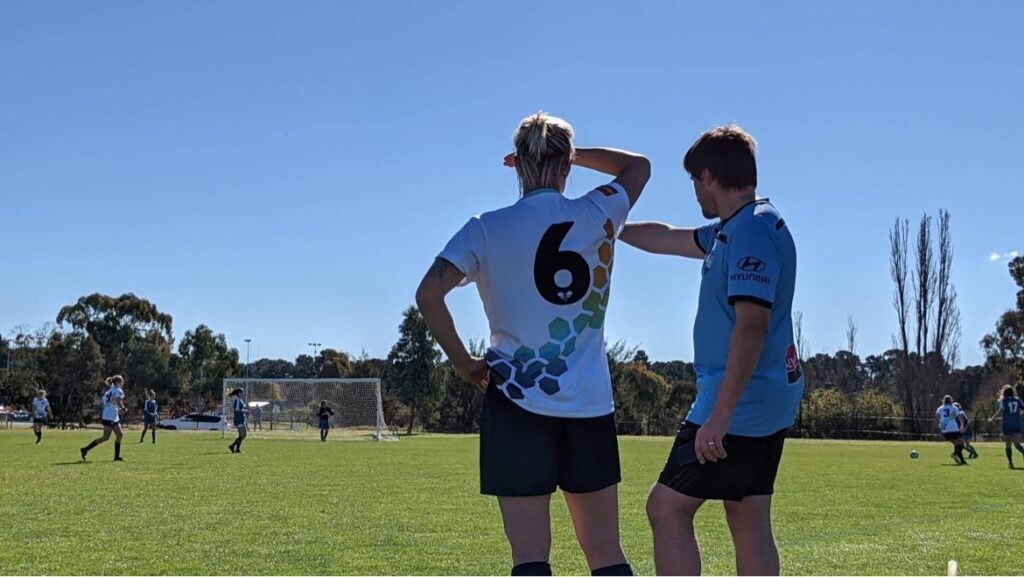
Community support grew in leaps and bounds as the season progressed.
Kat: “We had a few kit sponsors that came on board, friends or family of some of the players to get us over the line with that. Probably the biggest change from when we [first] spoke was the SportsTec Clinic in Kingston came on board and provided game day sports trainers. Initially, the relationship with them was a discount with physio and pre-season strength and conditioning, but they came to us and said they wanted to be [more] involved and ended up providing this really lovely young physio student to come up to cover our games on the weekend. In the State Leagues that’s unheard of, you just don’t have someone there to strap your injuries, it just really felt extra special, and was really helpful.
“Next Player (Joma) came on board and they were fantastic in helping us out with merchandise and polos and t-shirts and the like, and a certain percentage of sales comes back to the club. They’ve been incredibly generous in getting everyone in matching gear.
“Liz [Osborne, the club’s Treasurer] and Ali [Maddalena, the club’s talented graphics designer] put in a lot of effort to make sure it was clean and crisp and nice to wear and quality gear that you actually want to put on when you’re going outside and having a run. It’s so heartening turning up to training and seeing everyone in matching gear with this logo that we’ve created, it’s just really special I think.
“I think the thing that went better than I thought was the kits and the merch. They just look so good, I love wearing them.”
Men who are keen to show their support for the club haven’t been left out of the club’s thinking. Items such as polo shirts and rain jackets are available which are suitable for men, and at least a dozen menfolk can be seen around town wearing club hoodies even though they are not men’s cuts.
Anyone interested in obtaining some very appealing Bees merchandise can do so from the Next Player portal – please make sure when registering an account that you indicate you are aligned with the South Canberra FC club.
Even Playing Field was also singled out for their ongoing support which involves supplying female-specific boots, goalkeeper gloves and kits.
Kat: “Helen from Even Playing Field provided brand new KeepHer gloves for all of our goalies, very exciting for me personally as they are my favourite goalie gloves! She also came down to training early on to show her range of Ida women’s boots and provides a club discount on all of her gear.”
Emma leaves the best success story for last: “The other cool thing we did this year is we hand made our trophies, maybe 10-12 of them.
“Sally Jean Davis (Shipard) runs woodworking workshops for women, children, and LGBTQ+ communities out at Wanniassa and we did a class with her before Covid-19 [struck], and she taught us to make our own trophies. Our trophies are intended to be perpetual, and they’ve been lovingly handcrafted by the women in the club.”
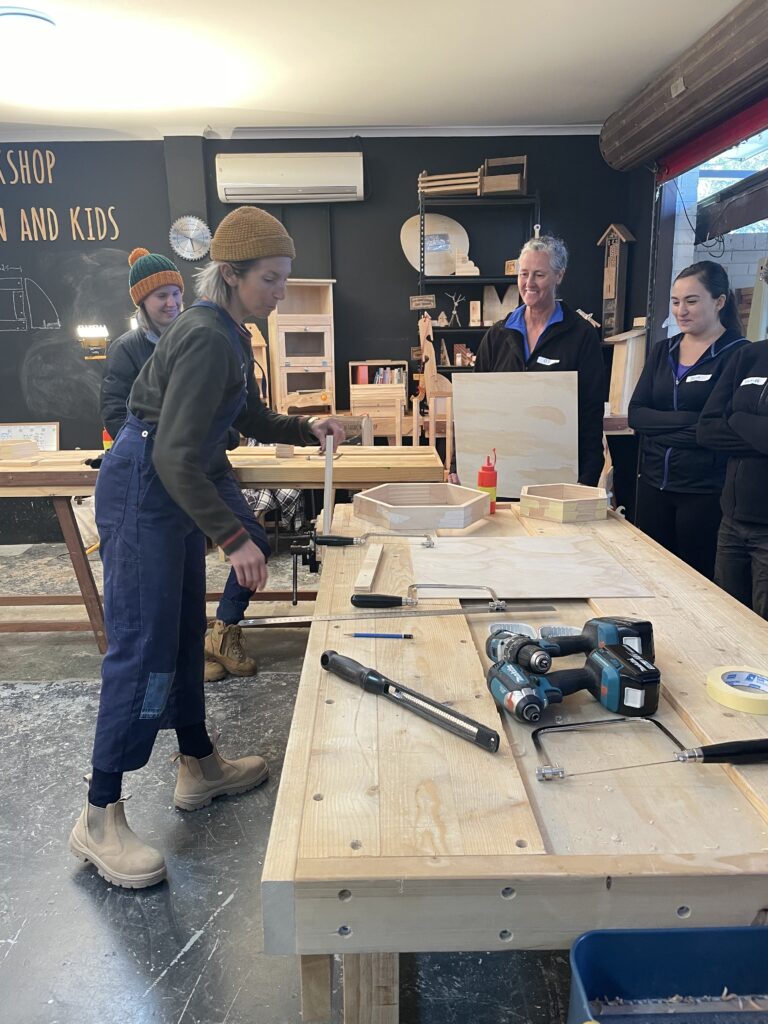
Kat: “I was too starstruck to go, she’s my all-time favourite player! But we named our South Canberra FC shipping container ‘Sally Shipping Container’ [laughs]”.
Challenges
Challenges included some that were a side effect of their success.
Kat: “When I think about the committee, it’s almost a gift and a curse having such a big committee [of 16]. It’s great having so many hands on deck, but you’ve got to really think through the most efficient use of all those people’s time and how we can make sure everyone is involved in a meaningful way without also overburdening people. So that was a bit of a learning, trying to figure out if you’ve got this many people, which decisions have to go to a full committee, which can be made in a smaller group, how do we keep things ticking along without having to bog committee meetings down with little things, that was a bit of a challenge and something that we worked through slowly.
On being overwhelmed by interest from players and having to turn some away:
Emma: “Every person we turned away we discussed with the committee, can we take them? If we’re full, maybe we can invite them to train …
Kat: “[Those that did] attended more regularly than the players in the squads!”
Grading in any community club isn’t easy. There is the constant tension of balancing players’ desires to play together versus placing and moving players up and down divisions in the name of results.
Kat: I actually think that grading for community clubs is really hard. And we’ve never nailed it, I’ve never nailed it in my years of football administration. This year was a bit unusual, we had Div 1 come over together as a team, so the deal there was their team was set. We graded for Divisions 2 and 3 and then filtered the rest into Division 4.
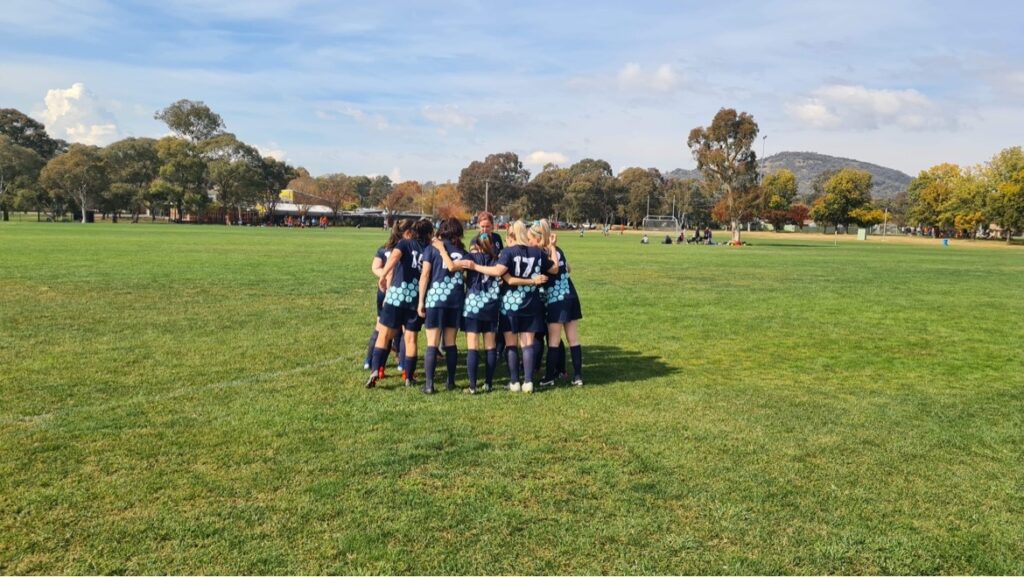
“What we’ve done in the past is that returning players can stay in the same grade that they want to if they wish, and then you grade to fill any gaps. We’ll have to have a think about that and see if that’s the same approach that we want to take [in 2022], or whether all positions are open.
“I’m not sure, I’m in two minds to be honest, because it is about the girls having an opportunity to play together with people they know and they like, and they’ve formed bonds in their teams already. So breaking that up just for the sake of grading and doing a little bit better seems a bit harsh … but also playing a season where you get pantsed every week is really crap.
“The other thing we had this year was a huge amount of injuries, just ridiculous, Div 1 was decimated with injuries really early on so I think that made things really hard.”
Emma: “At least one pregnancy as well, which left a bit of a gap.”
There would be a sting in the tail for the Bees. While the Canberra football community played most of the 2021 campaign as scheduled, lockdowns led to the season’s cancellation, which meant no finals football and the inability to properly celebrate the club’s achievements in their first year.
Kat: “I’m mainly just disappointed we didn’t get to have an end of season do, it would have been really nice to celebrate with everyone the achievements of the club. It would have been nice to mark the first season together as a group. Hopefully, in a couple of weeks, we can go and have a BBQ on an oval somewhere, stand two metres apart and have a sausage or something, and just see everyone again.”
Plans for 2022
Both Kat and Emma would prefer 2022 to be a year of consolidation but are unsure right now if that will be the case.
Emma: “We have been budgeting for an extra team, but at the end of the day, it will come down to how many girls stick around for 2022. We may not need to grow but I think to be comfortable a consolidation year would be really nice. Whether we maintain the momentum that we had this year into one [more] year and make 2023 a consolidation year [or not], we’ll do a full review of our finances and see where we’re comfortable and that might make the decision for us.”
Kat: “Part of the difficulty as well is training space. We’re really limited to what we can access at the moment so we can’t expand too much because we’ll have nowhere for people to train. We’re sharing [two pitches] – the Narrabundah men are still training there and there’s a gridiron club that trains there, so there’s a few community clubs using the same space.”
Another 2022 initiative for the club came via the ACT government.
Emma: “We were lucky enough to be awarded a grant from the ACT government for women’s participation, around $2500, and that is to go towards a new initiative that we’ve got that we’re formulating at the moment to provide a subsidy and pay for registration and kit costs for women who want to get into community sport but find it financially prohibitive.”
There’s no doubt that the abundant enthusiasm within the club will make 2022 another season to remember for South Canberra FC. Beyond 90 wishes them all the best for their second chapter.


